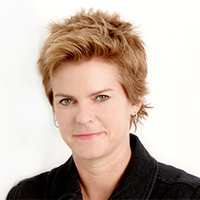The New Retirement Reality for Women
A woman's road to retirement has a few extra hurdles. To successfully jump them, they may want to rethink what retirement means in today's world.


Profit and prosper with the best of Kiplinger's advice on investing, taxes, retirement, personal finance and much more. Delivered daily. Enter your email in the box and click Sign Me Up.
You are now subscribed
Your newsletter sign-up was successful
Want to add more newsletters?

Delivered daily
Kiplinger Today
Profit and prosper with the best of Kiplinger's advice on investing, taxes, retirement, personal finance and much more delivered daily. Smart money moves start here.

Sent five days a week
Kiplinger A Step Ahead
Get practical help to make better financial decisions in your everyday life, from spending to savings on top deals.

Delivered daily
Kiplinger Closing Bell
Get today's biggest financial and investing headlines delivered to your inbox every day the U.S. stock market is open.

Sent twice a week
Kiplinger Adviser Intel
Financial pros across the country share best practices and fresh tactics to preserve and grow your wealth.

Delivered weekly
Kiplinger Tax Tips
Trim your federal and state tax bills with practical tax-planning and tax-cutting strategies.

Sent twice a week
Kiplinger Retirement Tips
Your twice-a-week guide to planning and enjoying a financially secure and richly rewarding retirement

Sent bimonthly.
Kiplinger Adviser Angle
Insights for advisers, wealth managers and other financial professionals.

Sent twice a week
Kiplinger Investing Weekly
Your twice-a-week roundup of promising stocks, funds, companies and industries you should consider, ones you should avoid, and why.

Sent weekly for six weeks
Kiplinger Invest for Retirement
Your step-by-step six-part series on how to invest for retirement, from devising a successful strategy to exactly which investments to choose.
By the year 2030, women will control as much as two-thirds of the nation’s wealth, experts estimate. Currently, women control $11.2 trillion (39%) of investable assets in the United States, according to the Center for Talent Innovation.
Although this financial progress is compelling, as women, we continue to face uphill financial challenges. This is especially true when it comes to preparing for retirement. Not only do women live longer, but we also need to save more for retirement.
Unique Challenges Face Women Moving Toward Retirement
Women earn less during their working years than their male counterparts, to the tune of 80%, meaning that on average women make 80 cents for every dollar paid to men, according to the National Partnership for Women and Families. We also tend to work fewer total years than men to take time off for family matters and caregiving.
From just $107.88 $24.99 for Kiplinger Personal Finance
Become a smarter, better informed investor. Subscribe from just $107.88 $24.99, plus get up to 4 Special Issues

Sign up for Kiplinger’s Free Newsletters
Profit and prosper with the best of expert advice on investing, taxes, retirement, personal finance and more - straight to your e-mail.
Profit and prosper with the best of expert advice - straight to your e-mail.
This “gender gap” equates to women saving significantly less for retirement than our male counterparts. It also means that women will likely receive less in government benefits like Social Security, which is based on income earned during our working years.
At the same time, we are living longer. According to the Social Security Administration, a 65-year-old woman today has a life expectancy of 87, versus 84 for a man of the same age. This longer life expectancy results in higher overall health care costs and the need for our retirement funds to last longer.
According to HealthView Services, women need to set aside at least 20% more to cover their medical bills in the final years of their lives.
The Balancing Act
Many working women — busy balancing family, career and other personal endeavors — tend to put retirement planning on the back burner, taking a passive approach to establishing realistic goals and working toward them.
This also means women are guessing at when they can retire, how much money they will need and how long their retirement funds might last. As women go through the retirement-planning process, they may be surprised by this retirement “disconnect.” Many learn that their expectations about retirement are inaccurate.
Even with these impending retirement shortfalls, working women are still eager to retire comfortably, and many hope to retire early. To meet these goals, delaying retirement by a few years or working at least part-time during retirement may prove to be a better option.
How Women Can Thrive in the New Retirement Reality
The good news is that the concept of retirement is changing. Rather than your retirement being an end-of-life phase, it can be a new beginning. There is a new retirement reality at play because of the challenges you face, but also because of the opportunities that living a longer life can bring, assuming that you stay healthy.
It may be time to rethink your retirement vision. Consider that if you were to retire early at 55, for example, you could potentially live another 30+ years. This is a very long time to be retired without any working activity or earned income.
Reinvention in retirement
Your retirement years can certainly include recreation and relaxation, but they can also be a wonderful time for reinvention! You may be able to retire from one career and begin a new career path altogether.
Some women are going back to school to earn a new or advanced degree in a different field or industry. I have one friend who retired from teaching and went to law school in her mid-50s. I have another who did the opposite: She retired early as a lawyer and went into teaching.
I know other women who established consulting practices after retiring from a long-term career where they have been able to leverage their knowledge and years of experience to build their own client base.
There are many opportunities to reinvent yourself based on your knowledge, skills, experience and interests. Ask yourself, “What have I always wanted to do?”
Consider a mini-retirement
Maybe you have a very demanding career and you are burned out. Perhaps you just can’t see yourself continuing on that same path beyond the next few years. Or, maybe you just need a break and some time to think about what you really want to do with the rest of your life. This is when a mini-retirement may come in handy.
A mini-retirement is similar to a sabbatical where you take some time off to explore your passions, interests and future work opportunities. If you work for someone else, it’s possible that your company would let you take an extended leave. You never know unless you ask.
I took a mini-retirement at age 40 when I left my 15-year career with a large financial institution. During this time, I explored what my most important values were and also had the opportunity to pursue one of my hobbies, performing as a singer-songwriter and recording artist. It was a wonderful time of soul-searching. After a year or so, I set up my own consulting practice and eventually returned to my career as a financial adviser, but this time on my own terms. I discovered that I still loved what I did; I just didn’t love the stuffy corporate environment I had been working in for so many years.
Only time away during my mini-retirement allowed me to uncover how I truly felt about my work and how to make the career work better for me.
What is Your Retirement Vision?
Regardless of how you decide to live out your years in the retirement life phase, creating your retirement vision requires your attention and intention. You don’t want to leave this to chance. It’s too important.
You will want to become more purposeful about the retirement vision you have for yourself and commit to doing what it takes now and in the future to prepare. Do you need to start acquiring new skills or building out your network? Talk to other women who have gone before you or who are doing what you’d like to be doing someday and ask their advice.
The earlier in your career that you become more purposeful about your retirement vision, the more time you have to make up for the “gender gap” and plan for your longevity.
Most importantly, believe in your ability to reinvent yourself and create the life you want beyond age 50. Embrace the idea of continuing to be active and engaged for as long as you live!
Profit and prosper with the best of Kiplinger's advice on investing, taxes, retirement, personal finance and much more. Delivered daily. Enter your email in the box and click Sign Me Up.

Stephanie Sammons is a Certified Financial Planner™ with more than 20 years of experience in helping professional women create and achieve their ideal retirement lifestyle plan.
Sammons Wealth Management is an independent, fee-only financial firm based in Dallas, Texas, and serving women nationwide. We build retirement lifestyle plans and manage wealth for professional women who are moving toward the retirement phase of their lives.
-
 Nasdaq Leads a Rocky Risk-On Rally: Stock Market Today
Nasdaq Leads a Rocky Risk-On Rally: Stock Market TodayAnother worrying bout of late-session weakness couldn't take down the main equity indexes on Wednesday.
-
 Quiz: Do You Know How to Avoid the "Medigap Trap?"
Quiz: Do You Know How to Avoid the "Medigap Trap?"Quiz Test your basic knowledge of the "Medigap Trap" in our quick quiz.
-
 5 Top Tax-Efficient Mutual Funds for Smarter Investing
5 Top Tax-Efficient Mutual Funds for Smarter InvestingMutual funds are many things, but "tax-friendly" usually isn't one of them. These are the exceptions.
-
 Social Security Break-Even Math Is Helpful, But Don't Let It Dictate When You'll File
Social Security Break-Even Math Is Helpful, But Don't Let It Dictate When You'll FileYour Social Security break-even age tells you how long you'd need to live for delaying to pay off, but shouldn't be the sole basis for deciding when to claim.
-
 I'm an Opportunity Zone Pro: This Is How to Deliver Roth-Like Tax-Free Growth (Without Contribution Limits)
I'm an Opportunity Zone Pro: This Is How to Deliver Roth-Like Tax-Free Growth (Without Contribution Limits)Investors who combine Roth IRAs, the gold standard of tax-free savings, with qualified opportunity funds could enjoy decades of tax-free growth.
-
 One of the Most Powerful Wealth-Building Moves a Woman Can Make: A Midcareer Pivot
One of the Most Powerful Wealth-Building Moves a Woman Can Make: A Midcareer PivotIf it feels like you can't sustain what you're doing for the next 20 years, it's time for an honest look at what's draining you and what energizes you.
-
 I'm a Wealth Adviser Obsessed With Mahjong: Here Are 8 Ways It Can Teach Us How to Manage Our Money
I'm a Wealth Adviser Obsessed With Mahjong: Here Are 8 Ways It Can Teach Us How to Manage Our MoneyThis increasingly popular Chinese game can teach us not only how to help manage our money but also how important it is to connect with other people.
-
 Looking for a Financial Book That Won't Put Your Young Adult to Sleep? This One Makes 'Cents'
Looking for a Financial Book That Won't Put Your Young Adult to Sleep? This One Makes 'Cents'"Wealth Your Way" by Cosmo DeStefano offers a highly accessible guide for young adults and their parents on building wealth through simple, consistent habits.
-
 Global Uncertainty Has Investors Running Scared: This Is How Advisers Can Reassure Them
Global Uncertainty Has Investors Running Scared: This Is How Advisers Can Reassure ThemHow can advisers reassure clients nervous about their plans in an increasingly complex and rapidly changing world? This conversational framework provides the key.
-
 I'm a Real Estate Investing Pro: This Is How to Use 1031 Exchanges to Scale Up Your Real Estate Empire
I'm a Real Estate Investing Pro: This Is How to Use 1031 Exchanges to Scale Up Your Real Estate EmpireSmall rental properties can be excellent investments, but you can use 1031 exchanges to transition to commercial real estate for bigger wealth-building.
-
 Should You Jump on the Roth Conversion Bandwagon? A Financial Adviser Weighs In
Should You Jump on the Roth Conversion Bandwagon? A Financial Adviser Weighs InRoth conversions are all the rage, but what works well for one household can cause financial strain for another. This is what you should consider before moving ahead.